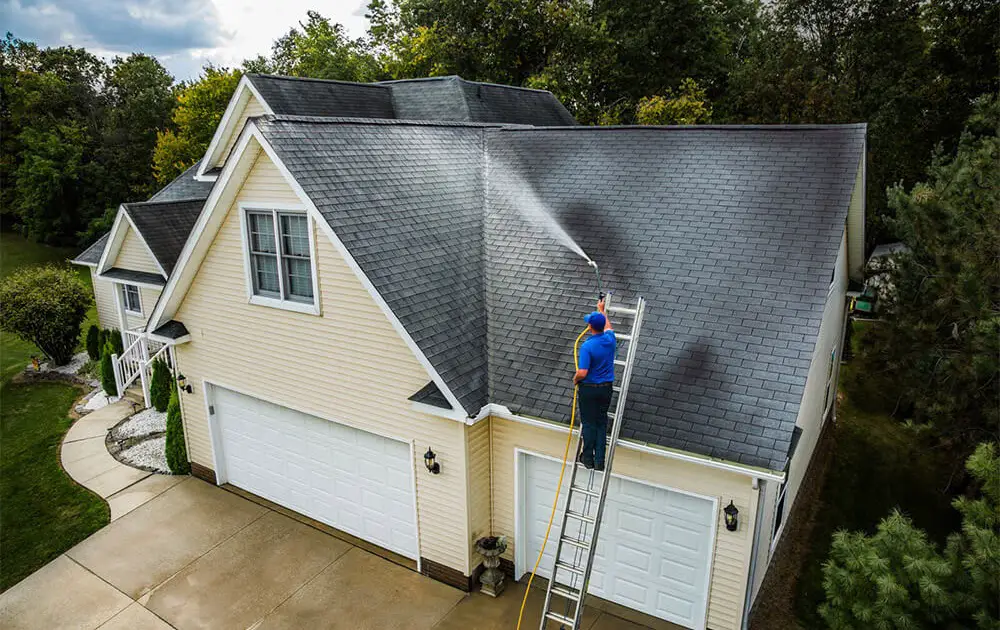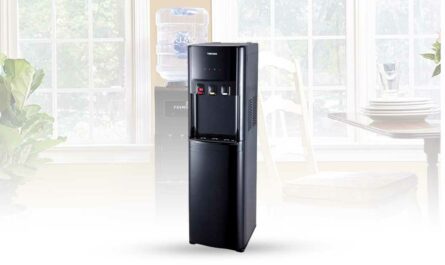What is roof soft washing? This question often arises among homeowners looking to maintain the aesthetic appeal and structural integrity of their homes. While it’s common knowledge that roofs require regular maintenance, determining the frequency of soft washing can be perplexing. In this article, we’ll delve into the intricacies of roof soft washing and provide guidance on scheduling this essential maintenance task.
Importance
Prolonging Roof Lifespan
The roof serves as the first line of defense against external elements such as harsh weather, debris, and environmental pollutants. Regular soft washing not only removes unsightly stains but also prevents the buildup of damaging substances that can compromise the roof’s integrity. By extending the lifespan of your roof, you can avoid costly repairs or premature replacement.
Understanding
Difference from Pressure Washing
It’s crucial to distinguish between soft washing and pressure washing when discussing roof maintenance. Unlike pressure washing, which utilizes high-pressure water streams to remove dirt and grime, soft washing involves a gentler approach using specialized detergents and low-pressure water. This method ensures thorough cleaning without causing damage to delicate roofing materials.
Factors Determining Frequency
Climate Conditions
The frequency of roof soft washing largely depends on the prevailing climate conditions in your area. Regions with high humidity levels or frequent rainfall may experience faster algae and mold growth, necessitating more frequent cleaning. Conversely, arid climates may allow for longer intervals between washes.
Surrounding Environment
The surrounding environment also plays a significant role in determining how often you should schedule roof soft washing. Homes situated near trees or bodies of water are more susceptible to organic debris accumulation, requiring more frequent cleaning to prevent roof damage.
Type of Roofing Material
Different roofing materials have varying levels of susceptibility to mold, algae, and other contaminants. While some materials may require annual soft washing to maintain their appearance and structural integrity, others can go longer between cleanings. Consulting with a roofing professional can help you determine the optimal cleaning schedule based on your roof’s material.
Recommended Frequency
General Guidelines
As a general rule of thumb, experts recommend scheduling roof soft washing every 1 to 3 years. However, this timeline can vary depending on the factors mentioned above. Regular inspections can help you assess the condition of your roof and determine when it’s time for maintenance.
Signs Indicating Need
Algae, Mold, and Mildew Growth
Visible signs of algae, mold, or mildew growth on your roof are clear indicators that soft washing is overdue. These unsightly stains not only detract from your home’s curb appeal but also pose potential health risks and accelerate roof deterioration if left untreated.
DIY vs. Professional
Pros and Cons of Each Approach
While DIY soft washing may seem like a cost-effective solution, it’s essential to weigh the pros and cons before embarking on this task. While hiring a professional soft washing service may incur additional costs, it ensures thorough and safe cleaning, minimizing the risk of damage to your roof or surrounding property.
Benefits
Enhancing Curb Appeal
A clean roof can significantly enhance the overall appearance of your home, boosting curb appeal and potentially increasing its resale value. By investing in regular soft washing, you can maintain a pristine exterior that leaves a lasting impression on visitors and passersby.
Risks
Structural Damage Risks
Neglecting roof maintenance, including soft washing, can lead to structural damage that compromises the integrity of your home. Algae, mold, and mildew growth can weaken roofing materials over time, leading to leaks, rot, and costly repairs. By addressing these issues proactively, you can safeguard your investment and ensure a safe living environment.
Cost Considerations
Factors Affecting Cost
The cost of roof soft washing can vary depending on various factors, including the size and complexity of your roof, accessibility, and the extent of cleaning required. While DIY options may seem more budget-friendly initially, professional services offer greater efficiency and effectiveness, potentially saving you money in the long run by preventing costly repairs.
Environmental Impact
Biodegradable Cleaning Agents
Concerns about the environmental impact of soft washing have led to the development of biodegradable cleaning agents that are safe for both your roof and the surrounding ecosystem. By opting for eco-friendly cleaning solutions, you can minimize harm to the environment while still achieving excellent results.
Common Misconceptions
“Roofs Are Self-Cleaning”
Contrary to popular belief, roofs are not self-cleaning. While rainwater may rinse away some surface dirt, it’s insufficient to remove stubborn stains or prevent the growth of algae and mold. Regular soft washing is essential to maintain your roof’s appearance and structural integrity.
Finding a Reliable
Researching Reputable Companies
When entrusting your roof to a soft washing service, it’s crucial to research reputable companies with a track record of excellence. Look for reviews, testimonials, and certifications to ensure you’re hiring a qualified and trustworthy provider who will deliver exceptional results.
Tips for Maintenance
Gutter Cleaning
In addition to soft washing, regularly cleaning your gutters is essential for preventing water damage and prolonging the lifespan of your roof. Clogged gutters can trap moisture, leading to roof leaks, mold growth, and structural deterioration. By maintaining clean gutters, you can ensure proper drainage and minimize the risk of costly repairs.
FAQs
How long does roof soft washing typically take?
The duration of roof soft washing can vary depending on factors such as the size of your roof, the extent of contamination, and the efficiency of the soft washing equipment. On average, a professional soft washing service may take a few hours to complete the task, while DIY methods may require more time.
Is roof soft washing safe for all types of roofing materials?
Roof soft washing is generally safe for most types of roofing materials, including asphalt shingles, tile, metal, and cedar shake. However, it’s essential to consult with a professional or refer to the manufacturer’s guidelines to ensure compatibility with your specific roof material. Certain delicate materials may require special considerations or alternative cleaning methods.
Can I schedule soft washing during any season?
While soft washing can be performed year-round, certain weather conditions may affect the effectiveness and safety of the cleaning process. Ideally, it’s best to schedule soft washing during mild, dry weather conditions to ensure optimal results and minimize the risk of damage to your roof or surrounding property. Avoid scheduling soft washing during extreme temperatures or inclement weather conditions.
What are the potential risks of DIY soft washing?
DIY soft washing can pose several risks, including damage to your roof or surrounding property due to improper equipment usage or cleaning solution application. Additionally, DIY methods may not achieve the same level of thoroughness or effectiveness as professional soft washing services, leading to incomplete cleaning and potential recontamination. To minimize risks, it’s advisable to seek professional assistance for roof maintenance tasks.
How can I maintain a clean roof between professional soft washing sessions?
To maintain a clean roof between professional soft washing sessions, consider implementing regular maintenance practices such as gutter cleaning, removing debris, and trimming overhanging branches to minimize organic matter accumulation. Additionally, promptly address any signs of algae, mold, or mildew growth by spot cleaning affected areas with mild detergent and water. Regular inspections can help identify maintenance needs and prevent issues from escalating.
Conclusion
In conclusion, the frequency of roof soft washing depends on various factors, including climate conditions, surrounding environment, and roofing material. By following general guidelines and staying vigilant for signs of contamination, you can ensure your roof remains clean and well-maintained for years to come.







